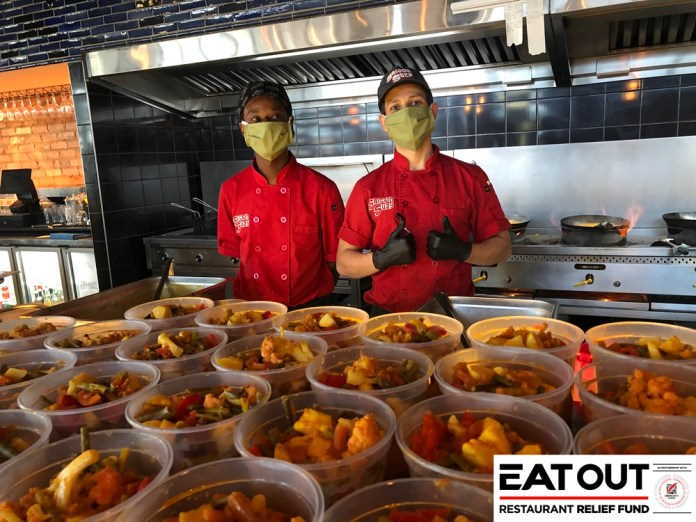This coming Saturday, 27 March 2021, will mark exactly one year since South Africa went into a strict level 5 lockdown to help curb the spread of COVID-19 and save lives.
“The restaurant trade is, unarguably, one of the industry’s most heavily impacted over the last year. It hardly seems adequate to describe this period as ‘tough’ or ‘challenging’ with well-established businesses and names in the industry vanishing almost overnight,” says Natalie Wilson, Head of Food at Food24 and Eat Out. “However, it has also been a year of determination to ‘do things differently’, and seeing the rush of development of new and innovative ways of doing business has been really thrilling too. Eat Out has been covering the past year’s highs, lows and in-betweens, and launched The Year We platform to share everything that has been encountered and is still being encountered.”
Restaurant closures
In an ever-changing landscape, it is difficult to state exactly how many restaurants have closed their doors over the past months. However, as at early February this year, the Restaurant Association of South Africa (RASA) estimated that number to be well into the thousands, with 3,630 restaurants on their database forced to close as a direct result of the level 3 lockdown alone.
2020 … the year we realised a deep appreciation for the simple act of visiting a restaurant and enjoying a culinary experience.
Alcohol bans and curfews
The prohibition drastically affected the wine industry, which lost an eye-watering R8 billion in local sales, according to Vinpro CEO Rico Basson.
By 25 January 2021, 770 restaurants had made the decision to close as the second alcohol ban continued. Despite the fact that the government lifted the alcohol ban and eased the curfew on 1 February 2021, a further 330 restaurants closed.
There is no way of knowing if another alcohol ban is on the horizon or whether the 9pm curfew will be re-instated, but the sad reality is that a number of our country’s great restaurants have not been able to weather the prohibition and curfew storms.
2020 … the year we appreciated wine like never before.
And yet, there have been some notable highlights – not only of new restaurant openings during these difficult times but, so too, the reimagining of others.
Reimagining
Among others, we have watched Pete Tempelhoff open a new spot at Buitenverwachting; Le Petit Colombe move premises; Freddie Dias open a new spot, Sejour; Matt Manning open a new wine bar; and Luke Dale Roberts’ reopening of a rebranded Shortmarket Club.
Liam Tomlin launched Mazza and Local as well as his new spot at Tintswalo, PJ Vadas started a new pasteis café, and the Oxalis pop-up came into being, supported by the previous team from Janse & Co.
COVID-19 innovation
The South African restaurant trade found new and innovative ways to stay in business. The Real Foods Group in Kloof Street Village, Cape Town, opened South Africa’s first COVID-19-ready restaurant, with four brands (Nü, Schoon, Free Bird and the newly launched Kofi) coming together in one place. To help limit human contact, there was a surge in the use of technology within restaurants and online menu and menu boards, and restaurants moved from sit-down dining only to takeout and deliveries. And the public stepped up, supporting their favourite local restaurant or eatery in a myriad of ways – helping not only to keep doors open but hope afloat.
Other success stories include Mama Bongi and her booming choc-chip cookie business and lockdown’s largest tip ever (R4,000), in support of the charity drive by Massimo, one of Cape Town’s favourite pizza spots.
2020 … the year we realised we could and DID.
Sustainability
Always a factor in the running of any business, the past few months has seen ‘sustainability’ take on a much deeper meaning. While traditionally, the term is often focused on procurement and provenance, now more than ever sustainability encompasses staying open and staying in business – now and into the future.
Earlier this year, Erin Louw of Retail Capital expressed the view that “things are not going to change very soon” and discussed the many ways in which restaurants and their staff have had to adapt in order to “futureproof your restaurant against any current or future legislative changes in relation to COVID-19 or any other challenge”.
She points to the explosion of dark or cloud kitchens and says that restaurants should be agile enough to ensure their kitchens can serve for sit-down, takeaway and delivery. “By balancing these, you are futureproofing your new restaurant against any current or future legislative changes in relation to COVID-19 or any other challenge.”
Makers Landing, a food community at the V&A Waterfront, is unique in that it has been set up with the support of the National Treasury’s Jobs Fund and the landlord (the Waterfront itself), which ensures sustainable support for the businesses and makers. The project has been in the pipeline for four years, explains project lead Westleigh Wilkinson, and opened in December 2020 – later than originally planned because of the impact of lockdown. Not only was the project able to provide rent relief, but it has also offered higher tenant allowances for fit-outs as well as access to additional capital.
2020 … the year we realised a new way of being IS possible.
New business models
The stark reality is that the dining experience of the foreseeable future will not be the same for quite some time. The traditional way of doing business and operating is broken, and restaurant owners the world over have had to explore and embrace new business models.
The birth of subscription models is but one example, with Kauai being the first player in the quick-service sector in South Africa to move in this direction, offering a coffee and smoothie subscription package via its digital app.
Other establishments have diversified to include a range of customised merchandise available to its loyal patrons.
The pandemic has also seen the teaming up of various complementary industries to support each other, with the Restaurant Rescue Project (RRP) a case in point. Founded by chef patron Matt Manning, it asked restaurant-goers to ‘go back’ to their favourite restaurants by purchasing dinner vouchers with an incentive to receive a complimentary case of quality estate wine when the ban is lifted. RRP was launched last year at a time when stricter regulations, which included a curfew and the prohibition of alcohol sales, were reinstituted. Within a few weeks, this initiative had already saved a few Western Cape restaurants from closure, securing the livelihood of many employees.
2020 … the year we reimagined and KEPT on going.
Helping others
The world over, with South Africa no exception, and across all areas of life, the last 12 months has seen the beauty of human nature and the true spirit of ubuntu. We have seen and read of the incredible work carried out by some of our restaurants and eateries as they opened their kitchens, establishing numerous feeding schemes to feed the hungry.
And we have also seen and read of many organisations stepping up to assist South Africa’s restaurant industry during these times. In conjunction with The Community Chest, Eat Out’s own Restaurant Relief Fund successfully raised over R2.7 million to support restaurants and communities in need and create over 1 million meals.
2020 … the year we learnt to be a little KINDER and, in the words of South Africa’s very own Good Things Guy, “love a little harder”.













